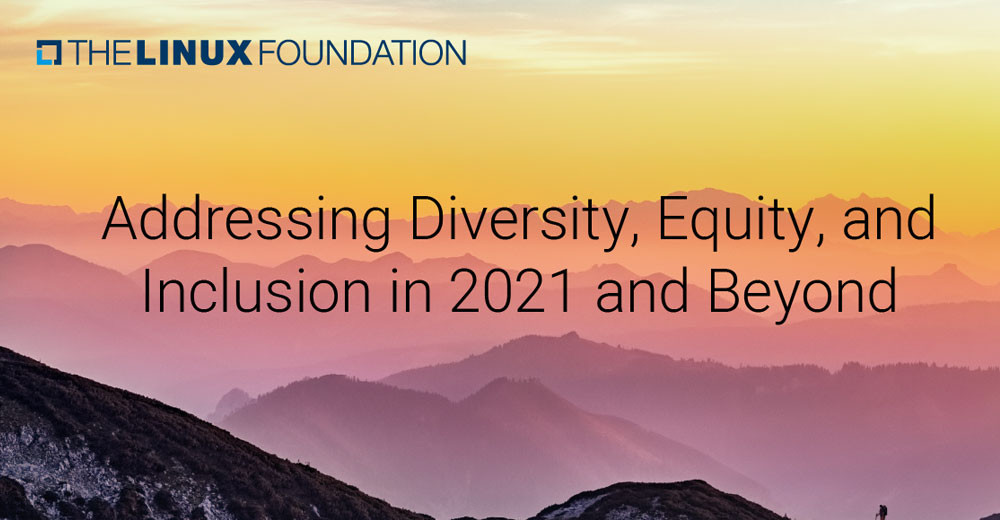The Linux Foundation (LF) has little concern from within the open-source community over diversity, equity, and inclusion (DEI), according to the first open-source DEI study in at least four years.
LF, the nonprofit organization enabling mass innovation through open source, on Dec. 14 announced the release of its latest LF Research study, “Diversity, Equity, and Inclusion in Open Source.” The study includes the results of qualitative interviews and a worldwide survey with more than 7,000 initial responses from the open-source community.
The foundation conducted the study to increase the industry’s collective understanding of the state of diversity, equity, and inclusion in open source, and to report important DEI practices. The sponsors of this research include Amazon Web Services (AWS), CHAOSS Community, Comcast, Fujitsu, GitHub, GitLab, Hitachi, Huawei, Intel, NEC, Panasonic, Red Hat, Renesas, and VMware.
The open-source community continues to grow at an unprecedented pace, and it is imperative that we understand that growth in the context of diversity, equity, and inclusion to collectively implement best practices that result in inclusive communities, said Hilary Carter, vice president of research at the Linux Foundation.
“The Diversity, Equity, and Inclusion in Open Source study gives us valuable insights that can lead to a more diverse global open-source community,” she noted.
Key Findings Revealed
The study disclosed five major attitudes about the state of DEI within the open-source community.
1. Eighty-two percent of respondents feel welcome in open source, but different groups had different perspectives overall.
The 18 percent of those that do not feel welcome are from disproportionately underrepresented groups: people with disabilities, transgender people, and racial and ethnic minorities in North America.
2. Increasing open-source diversity reflects growing global adoption, but there is still much room to improve.
As the global adoption of open-source technologies grows rapidly, so, too, is diversity within open source communities. But there remains a lot of room for growth: 82 percent of respondents identify as male, 74 percent identify as heterosexual, and 71 percent are between the ages of 25-54.
3. Time is a top determinant for open-source participation.
Time-related barriers to access and exposure in open source include discretionary and unpaid time, time for onboarding, networking, and professional development, as well as time zones.
4. Exclusionary behaviors can have a cascading effect on contributors’ experiences and retention.
Exclusionary behavior has cascading effects on feelings of belonging, opportunities to participate, achieve leadership, and retention. While toxic experiences are generally infrequent, rejection of contributions, interpersonal tensions, stereotyping, and aggressive language are far more frequently experienced by certain groups (two-to-three times higher frequency than the study average).
5. People’s backgrounds can impact equitable access to open-source participation early in their careers, compounding representation in leadership later on.
Only 16 percent of students’ universities offer open source as part of their curricula. This, along with unreliable connectivity, geographic, economic, and professional disparities narrow an individual’s opportunity to contribute.
“Understanding the state of diversity, equity, and inclusion in the open-source community is critical for business strategy and nurturing an inclusive culture,” said Demetris Cheatham, senior director, Diversity and Inclusion Strategy at GitHub.
Focus on Pain Points
This newest data encompasses both qualitative and quantitative research from the Linux Foundation. It helps direct attention on the things that matter most to our employees and the great community and industry, added Cheatham.
Study after study reveals that diversity among technology builders leads to better, more robust technologies. But the industry continues to struggle with increasing diversity.
The open-source software community is no exception. Building and sustaining inclusive communities can attract a more diverse talent pool, prioritizing the next generation of open-source technologies, according to LF officials.
LF’s study identifies the state of DEI in open-source communities. It also highlights the challenges and opportunities within them and draws conclusions around creating improvements in much-needed areas.
Understanding data behind diversity, equity, and inclusion in the open-source community allows focusing on identifying areas for focus and improvement, noted Nithya Ruff, Comcast Fellow, Head of Comcast Cable Open Source Program Office, and Linux Foundation board chair.
“The open-source community will greatly benefit from the actions we take to grow engagement and make it a welcoming place for everyone,” she said.
More information on the Linux Foundation’s DEI initiatives are available here.
LF Doubles Down
The Linux Foundation took several steps to improve diversity in open-source communities by supporting new projects, noted Jim Zemlin, executive director of The Linux Foundation, in the report’s Forward section.
These projects include the Inclusive Naming Initiative, which seeks to remove non-inclusive language from project repositories, and the LFX Mentorship Program to help developers from diverse backgrounds gain the necessary skills to effectively contribute to open-source communities.
LF grants almost $1 million per year in travel funding and registration scholarships to those from diverse backgrounds to join events and nurture relationship building and learning through face-to-face collaboration via the Linux Foundation Travel Fund, Zemlin added.
In addition, DEI programs and outreach are part of LF events designed to create open and welcoming spaces that reflect the diversity the foundation wants to see across the ecosystem.
LF also helped advocates in the community launch the Software Developer Diversity and Inclusion Project (SDDI) to explore, evaluate, and promote best practices from research and industry to increase diversity across all dimensions. These include race and ethnicity, gender identity, age, and cognitive ability to ensure an environment and culture of inclusion in software engineering.
“While these are important steps to creating inclusive communities, it is incumbent upon us all to do more. And through new DEI research, we have an opportunity to double down or redirect our efforts to improve open-source environments with quantifiable data,” he wrote.
Shifted Priorities Needed
The free and open philosophy at the heart of open source brought about revolutionary advancements in technology, software, and standards. But as open source permeates global industries, markets, power structures, and beyond, code is no longer enough, according to the report.
Shifting from systemic (if passive) exclusion of non-coders toward a more proactive and inclusive open-source ecosystem manifests the very ethos on which open source was founded. Many perspectives lead to better technologies, better products, and more inclusive digital economies, the LF report concludes.


























































Equity, the new buzzword for equality is an unattainable goal. The only way things can be totally equitable is for everyone to have had the same experience in life, and that will never happen.